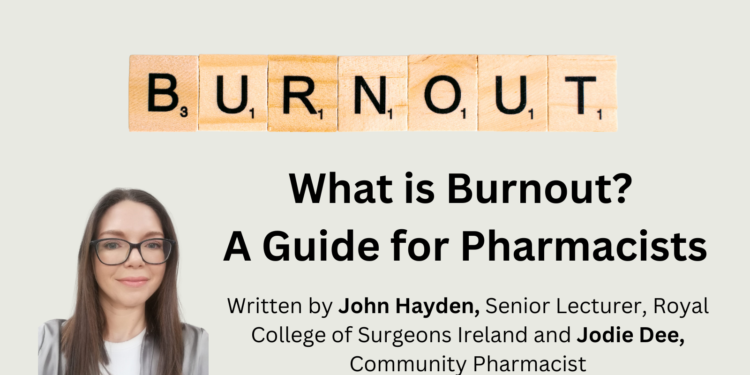Burnout is a term used to describe the psychological response to work related stress, presenting as emotional exhaustion, increased levels of depersonalisation and cynicism and a reduced feeling of personal accomplishment. It’s described as an occupational phenomenon that occurs when chronic stress is ineffectively managed, though it is not considered a medical condition.

Written by John Hayden, Senior Lecturer, Royal College of Surgeons Ireland and Jodie Dee, Community Pharmacist
The term burnout was first coined in the 1970’s and since then, there has been an explosion of interest in researching this concept and burnout has been characterised and studied among a wide range of professions to understand how it occurs and the contributing risk factors that lead to burnout. This has subsequently lead to the development of multiple burnout assessment questionnaires. Burnout rates are particularly high among pharmacists and has been associated with reduction in productivity, increased job turnover and reduced psychological and physical wellbeing. The subsequent negative impact on patient care is significant, resulting in increased likelihood of medication errors and reduced quality of care.
This is of importance as the role of the pharmacist in healthcare provision has evolved rapidly. Across all pharmacy practice settings, there has been an expansion in the scope of practice for pharmacists. With a growing ageing population worldwide, multimorbidity and polypharmacy is now commonplace and pharmacist-directed care and medicines management is becoming increasingly complex. Pharmacists play a vital role in the safe and efficient use of medicines, continuity of supply amid regular medicines shortages, compounding of medicines, medicines information, research and policy making. In addition, patient-facing pharmacists, especially those in a community setting, are a substantially utilised resource by the public, due to pharmacies’ convenience, accessibility and free services, resulting in high patient and prescription volumes, frequent clinical consultation and patient education. This increase in workload and responsibility may impact pharmacists’ physical and psychological wellbeing and rates of burnout.
A recent study of Irish pharmacists found that over 62% of participants were experiencing moderate to high levels of burnout, which is in line with burnout prevalence among pharmacists globally. Associated risk factors increasing rates of burnout included longer working hours, less professional experience, high patient and prescription volumes, excessive workload, high levels of non-clinical or administrative duties and poor work/life balance.
Those that were experiencing burnout were more likely to have made a medication error and were more likely to leave their current employment. Factors associated with a lower rate or protective effect against burnout were involvement in patient and peer education and training, time away from work, regular social interactions and hobbies, and availing of burnout management resources. Since burnout is centred around poorly managed stress, it is important that we look after both our mental health and physical health.
Healthy habits like keeping active, eating well and being part of a social group all contribute to relieving stress and anxiety, as well as self care techniques such as meditation, mindfulness and journaling. There are a number of wellbeing resources for pharmacists, available on the IIOP resource hub. Managing stress at work can be challenging, but it is important that we prioritise a positive working environment and a positive attitude, as psychological safety and optimism are predictors of burnout.
Having realistic work goals and setting boundaries between work and personal life all contribute to a better work/life balance and reducing work related stress and burnout. While there are many things we can do to manage stress and burnout as individuals, ultimately organisational change and review of current pharmacy practice and work culture in Ireland needs to be addressed.
There is no doubt that the organisational structure of community pharmacy in Ireland is contributing to burnout and community pharmacists have the highest rates of burnout.
The PSI’s Workforce Intelligence Report identified that pharmacists experience high levels of stress and some of the sources of stress are inherent in our work culture, such as the high administrative and paperwork burden, a lack of proper lunch breaks or having to stay on the premises to supervise all medicine sales.
Thankfully, this report has made several recommendations and associated actions and timeframes to address current shortcomings in pharmacy (stress and burnout being one of them) which we will hopefully see being rolled out in the coming years. Burnout is a legitimate concern that can have a negative impact on pharmacists and patients, so it is vital that we are aware of the signs and take proactive steps to prevent it and utilise the resources we have to manage work related stress.
Self-care and creating a positive work environment are essential in its management.











